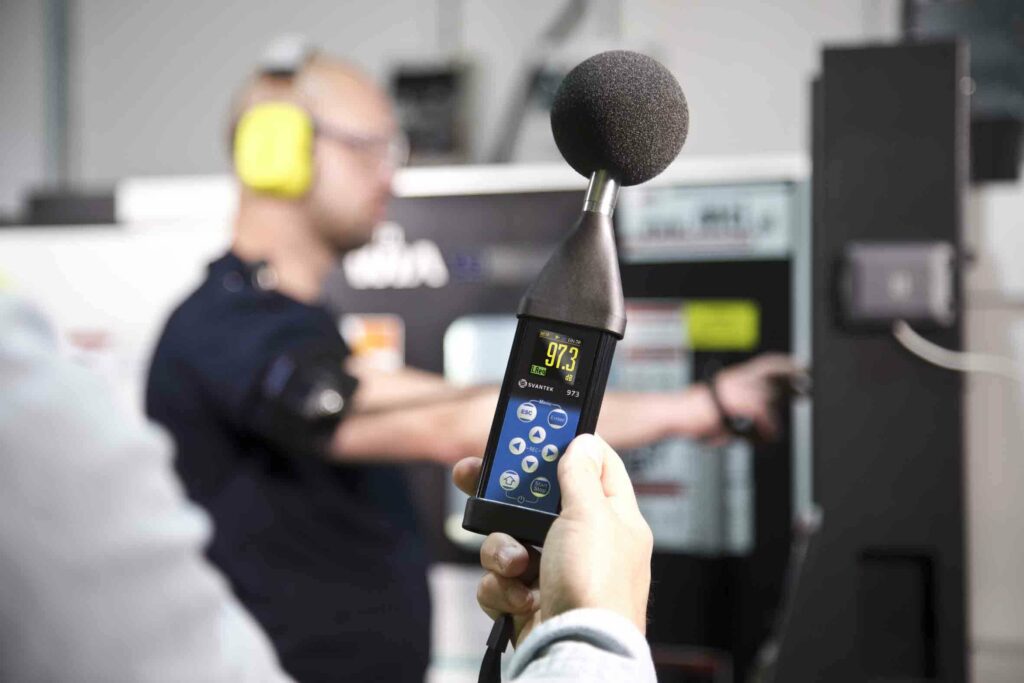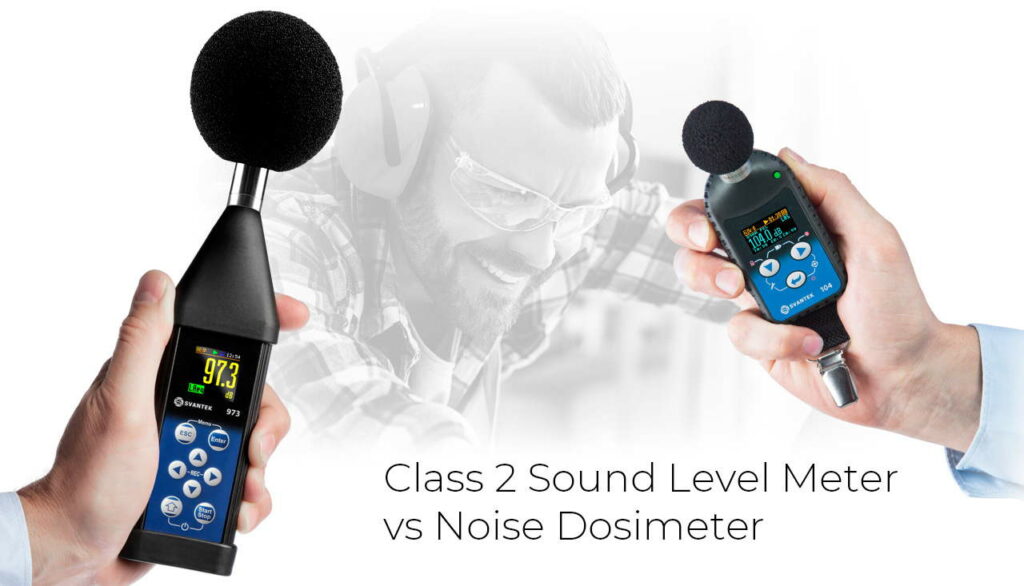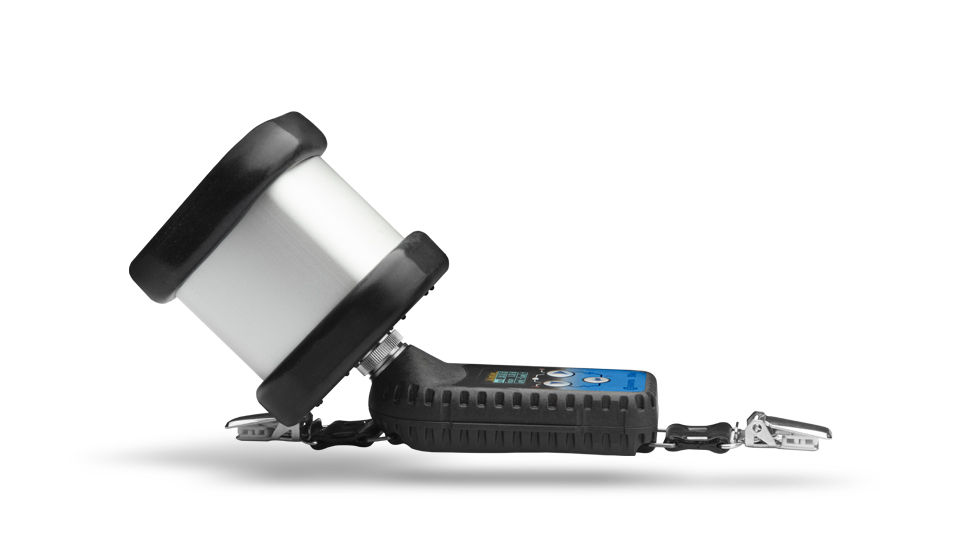A decibel meter is a casual term for what is technically known as a sound level meter. It refers to cheaper, less reliable meters measuring sound.
A decibel meter, or a sound level meter, measures sound pressure levels (SPL), expressed in decibels (dB), representing the ratio between the measured sound pressure and a reference level. Typically, dB meters are used for noise measurement in industries, urban environments, and workplaces, ensuring compliance with noise regulations.

Most dB meters are designed to measure sound levels from 30 dB to 130 dB, covering a wide range of common noise environments. This range is ideal for assessing normal conversation (around 60 dB) to noisy industrial settings (approaching 130 dB). SPL meters with this range are versatile tools for noise measurement in workplaces, public areas, and homes.
The accuracy of decibel meter readings largely depends on the quality of the hardware and its compliance with IEC 61672 standards. Meters that meet this standard and undergo regular calibration provide reliable measurements. In particular, digital sound level meters offer higher accuracy than analog ones, while smartphone meter apps are less precise and should be used only for rough estimates.
A decibel meter often referred to casually, is typically a simpler and less precise tool than a professional sound level meter. While both measure sound pressure levels (SPL) in decibels, a decibel meter is often associated with cheaper devices that lack the precision required for formal assessments. In contrast, a sound level meter, compliant with international standards like IEC 61672, provides more accurate and reliable readings. It is used for professional noise monitoring and ensures compliance with regulations. A decibel meter is generally suitable for casual use, while a sound level meter is essential for industrial and legal purposes.
In essence, while both devices measure sound levels, a noise dosimeter is a highly specialized and accurate tool for professional use, making it incomparable to a standard decibel meter designed for casual use:
While digital sound level meters provide accurate measurements with proper calibration, smartphone meter apps and online dBAmeters offer limited precision and should only be used for casual, non-professional assessments. Professional digital meters, especially those complying with IEC 61672, ensure higher accuracy in measuring acoustic pressure and are preferred for regulatory and legal purposes.

| Feature | Decibel Meter | Class 2 Sound Level Meter | Noise Dosimeter |
|---|---|---|---|
| Purpose | Casual, spot-check sound measurement | Standard noise assessment, compliance with workplace noise regulations | Continuous personal noise exposure monitoring |
| Usage | Non-professional use, rough estimates | Workplace noise assessments, environmental noise monitoring | Personal noise exposure over work shifts |
| Measurement Range | 30 dB – 130 dB | 30 dB – 137 dB (140 dB peak) | 70 dB – 137 dB (140 dB peak) |
| Frequency Range | Limited, varies by device | Up to 8 kHz | Up to 8 kHz |
| Mounting | Hand-held | Hand-held or tripod | Worn on a shoulder or collar |
| Accuracy | Unknown, depends on quality | Compliant with IEC 61672-1 | Compliant with IEC 61672-1 |
| Calibration | Not required, typically not performed | Acoustic and electrical calibration required | Acoustic and electrical calibration required |
| Continuous Measurement | No | Yes, recommended with tripod use | Yes, continuous over an entire shift |
| Regulatory Compliance | No | Yes, complies with regulations for workplace noise | Yes, required for regulatory noise exposure compliance |
| Recording Time | No long-term recording | Short-term, stationary measurements | Long-term, stores LAeq for at least 8 hours |
| Applications | Non-professional noise checks | Noise surveys in workplaces, environmental noise | Personal noise exposure in industrial environments |
| Price Range | Typically under $500 | $1,000 – $2,000 | $1,600 – $3,500 (kits and accessories included) |
Decibel meters priced under $500 often lack the precision, proper calibration, and standard compliance required for professional-grade measurements. These cheaper meters typically do not meet the specifications outlined in IEC 61672, which means their readings are only estimates and should not be trusted for formal reporting, regulatory compliance, or legal purposes. Without the necessary traceable calibration and adherence to standardized procedures, the data produced by these devices is not reliable for any situation where accuracy is critical.
Calibration is the process of comparing a sound level meter’s readings to a known reference level to ensure its accuracy. Regular verification is necessary to maintain consistent performance, particularly in meters designed to meet IEC 61672 standards. It ensures that measurements reflect true sound pressure levels, making the device reliable for noise assessments.

Self-made noise measurements using non-standard meters or devices without traceable calibration do not comply with ISO/IEC procedures and should be treated as rough estimates. Since these measurements lack the accuracy of professional tools, they are unreliable and should not be used in any legal or compliance-related context. The absence of standardized calibration and proper measurement techniques can lead to significant errors, rendering the data unsuitable for regulatory purposes or formal reports.
To achieve accurate sound measurements, non-professionals should invest in a Class 2 sound level meter that meets IEC 61672 standards. Although these meters may cost around $1000, they ensure the level of precision necessary for DIY noise assessments and basic environmental or workplace noise monitoring. Moreover, following the correct measurement procedures, such as positioning the meter correctly, considering the frequency weighting (e.g., A-weighting), and regularly calibrating the device, can further enhance the reliability of the results.
Class 2 sound level meters are primarily used for noise surveys in workplaces, where class 1 precision is not required by regulations. They are suitable for routine workplace noise assessments, ensuring compliance with occupational noise regulations. While their frequency range (up to 8 kHz) is narrower than Class 1 meters (up to 16 kHz), they provide reliable data for most general applications in workplace noise monitoring, such as assessing employee exposure and evaluating the need for hearing protection.
A professional sound level meter is essential for tasks requiring precise noise monitoring and compliance with legal regulations, such as workplace noise assessments. For on-site surveys, a portable SPL meter allows for easy transport and use in the field. Non-professional or casual measurements may not require such accuracy, but professional-grade meters are necessary for official reporting.
Hiring an acoustic consultant or accredited lab is necessary when precise, legally-binding, or compliance-driven noise measurements are required. These professionals use calibrated instruments that meet IEC standards and follow ISO/IEC procedures to ensure that measurements are accurate and can stand up to regulatory scrutiny. In cases involving legal disputes, workplace safety, or environmental noise regulations, measurements performed by certified professionals are often the only data accepted by courts or regulatory bodies.